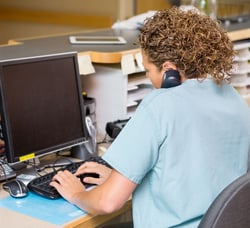
If you ask healthcare workers what their “new normal” is since the outbreak of Covid-19 you will probably get a variety of answers. Some responses you might expect to hear are that they have limited PPE, they have chosen to self-isolate themselves from their family while treating patients, and unfortunately that some have been laid off due to lack of routine visits. What you might not expect to hear, are that some health care providers are taking on new roles to help fight this pandemic.
How One Radiology Department Stepped Up
Radiologists from New York University (NYU) Langone Health were looking for a way to help not only the numerous patients diagnosed with Covid-19, but their colleagues as well, who are overwhelmed caring for multiple patients at a time. In the article, "NYU Radiologists Answer the Call During Covid-19 Surge," Dr. Myles Taffel an abdominal imaging specialist at NYU, describes their new program, NYU Family Connect, as a way for radiologists who have experienced a drop in patient volume to serve as information liaisons. Since the hospital isn’t allowing visitors, the group of radiologists serve as a vital resource to deliver updates to family members when doctors simple don’t have the time.
Taffel says "The way I like to describe it is almost a survivor's guilt, I'm 15 years out from internship, and I would be lost on the floor. We were just looking for somewhere to give back."
The staff at NYU aren’t the only ones taking on new roles during the Covid-19 crisis. Hospitals across the country are using the Academy of Medical-Surgical Nurses’ (AMSN) self-assessment tool to help match new hires , retired healthcare professionals, and transplants from other parts of the hospital to a new position that matches their skill set states the article "Online Tool Helps Hospital Place Staff in Appropriate Roles During Covid-19 Pandemic."
A New Normal Means New Roles
The American Medical Association (AMA) has multiple resources listed in their article, "Caring for our Caregivers During Covid-19," that suggests ways hospitals can and have reorganized their infrastructure to help their staff during this challenging times.
 Some of their recommendations include setting up a triage hotline run by medical students who aren’t ready to take on patients of their own, having staff that are working from home manage the inboxes of other co-workers who are at work, and allowing medical assistants and nurses make contributions according to their skill level with physician oversight.
Some of their recommendations include setting up a triage hotline run by medical students who aren’t ready to take on patients of their own, having staff that are working from home manage the inboxes of other co-workers who are at work, and allowing medical assistants and nurses make contributions according to their skill level with physician oversight.
No matter what extra steps healthcare providers are taking during this stressful time, one thing remains clear, caregivers are working around the clock trying their best to keep others as healthy and safe as possible while putting their lives on the line.
Here at Beekley Medical we would like to send our deepest gratitude to all the brave men and women on the frontline of this crisis. We are proud to do our part by continuing to provide world class customer care.
Related articles:

Megan Sargalski
Marketing Communications Specialist
